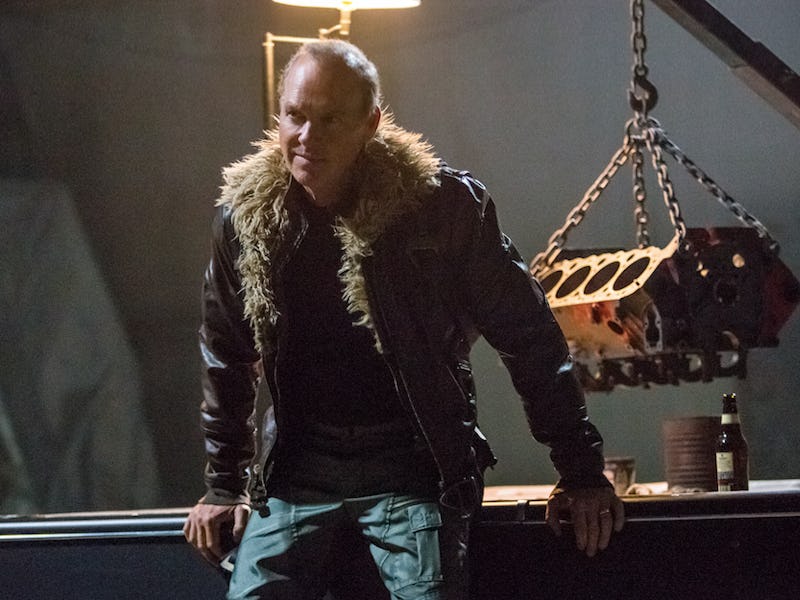The Vulture Solves Marvel's Villain Problem But Creates Another
A working-class hero (or bad guy) is something to be.

As refreshing as it was for Spider-Man: Homecoming to insert a relatable, awkward superhero into a Marvel Cinematic Universe filled with gods and super soldiers, even more welcome was the introduction of a three dimensional and empathetic villain.
Antagonists have been a consistent thorn in the side of the massive, ongoing film franchise since its launch in 2008. With the exception of Loki, who caused mischief in Thor and then again in The Avengers, MCU villains have been largely perfunctory and disposable. Otherwise great films have struggled in the third act because their villains were terrible — Captain America: Civil War slowed when it turned to Zemo, and the big final battle in Guardians of the Galaxy Vol. 2 took place inside Kurt Russell’s alien stomach. Even the overarching baddie of the MCU, the blue god Thanos, is a cartoonish goofball who hasn’t had any luck getting the Infinity Stones he so craves.
So, part of what made Spider-Man: Homecoming so enjoyable was the fact that after the fun and games segment with the hero was over, there was a villain with a point worth considering and a motivation you couldn’t really question. In Adrian Toomes’s Vulture, played with equal parts fatherly charm and the ambition of a man with an axe to grind, Peter Parker is up against far more than a generic villain intent on conquering and/or destroying the world.
The movie backtracks to the aftermath of the Battle of New York, the epic third act throwdown between the Avengers and Chitauri back in 2012. Faced with a massive recovery, the government gave contracts to scores of cleanup and construction crews, each of which tends to a different piece of the wreckage. Toomes, a lifelong blue-collar worker, runs a salvage crew that gets assigned to clear some of the fallen Chitauri ships. They’re doing a competent job, but soon enough, Tony Stark saunters in, flanked by government agents who say that Stark Industries is taking over the job.
Toomes protests that he earned the contract fair and square, and furthermore, he sunk all his savings into the equipment necessary to do the heavy job. But the suits at the Department of Damage Control don’t particularly care about his plight, and Toomes and his crew are booted from the site.
Sure, maybe Stark Industries was better equipped to deal with the superpowered and very dangerous wreckage, but to Toomes, it came across as yet another example of the connected elites stealing from the little guy. Even the audience, having been charmed by Robert Downey Jr.’s suave Stark for nearly a decade, can’t help but feel that Toomes got a raw deal.
Before he leaves the site, Toomes swipes a fragment of Chitauri technology, and once he discovers the power it contains, he uses the stolen wreckage to create seemingly unstoppable weapons. Toomes and his crew sell the alien tech on the black market while also developing cutting edge machinery to protect against any shady buyers (the illicit arms trade tends to be a bit dicey). He’s not out for world domination, but he has no problem facilitating it for the right price; he just wants to make a whole lot of money to support his family after years of barely getting by on his working-class salary.
Who's the good guy?
Even when he starts raking in the cash from eager criminals and terrorists, and builds a monster house in the suburbs, he justifies his continued activities by positioning himself as a populist anti-hero. “The rich and the powerful, like Stark, they don’t care about us,” he tells Peter later on in the movie, having already cracked his secret identity. He sounds like he’s leading a union strike or speaking in an early slot at the Democratic National Convention, not unveiling an evil comic book plan. He doesn’t even have a diabolical laugh; this is serious business to him.
Assigning political relevance to big-screen blockbusters and TV shows has become a favorite past time for both bloggers and filmmakers trying to sell their movie. Above all, these projects are financed by multinational corporations run by millionaires (and sometimes billionaires) who are in pursuit of maximum profits. So I’m loathe to suggest that Spider-Man: Homecoming is any sort of current events-driven call to arms — especially because the liberal soul-searching about how Democrats lost the working-class, white vote began long after the movie wrapped. But the working and middle classes of America have been under assault for the last 35 years, creating an economic anxiety that clearly influenced the six writers (including director Jon Watts) who worked on Homecoming.
A movie ticket is now a luxury item, with prices that can climb up to $25 apiece in New York City. That alone is enough to make you angry, and so Toomes’s big speech to Parker about how the odds are being stacked ever-higher against people who can’t pay for their own lobbyists really resonates. Of course, you can’t abide by the trafficking of weapons of mass destruction, and Toomes does go off the deep end, but remember, before he grew a conscience and became Iron Man, Tony Stark was also an arms dealer. He just did it via legal means, which were open to him thanks to his inherited wealth.
It’s actually unfortunate that the Vulture had to be the villain here. His concerns are swept under the rug, thus delegitimizing them. And he’s pitted against Peter Parker, another working-class New Yorker. That’s a microcosm of how the elites keep power, after all.